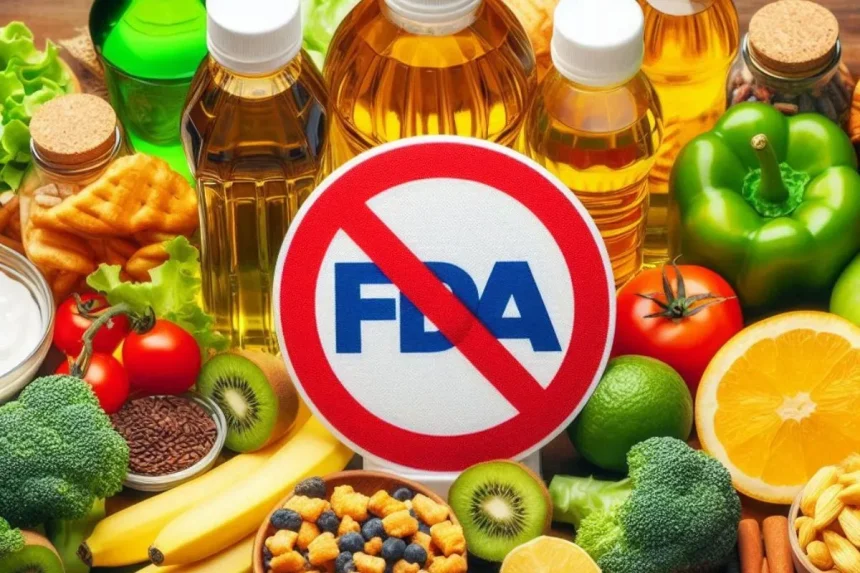In a significant move towards improving food safety and public health, the U.S. Food and Drug Administration (FDA) has announced a ban on brominated vegetable oil (BVO) as a food additive, effective August 2, 2024. This decision, based on mounting scientific evidence of BVO’s potential health risks, marks a pivotal moment for the food and beverage industry. This article provides an in-depth analysis of the reasons behind the ban, the implications for manufacturers and consumers, and the broader context of food safety regulations.
The History and Use of BVO
Brominated vegetable oil has been used in the food and beverage industry for decades. Its primary function is to stabilize citrus flavors in sodas and sports drinks, preventing the flavoring from separating and floating to the top. BVO is derived from vegetable oil that is bonded with bromine, a chemical element. The addition of bromine helps maintain the homogeneity of beverages, making BVO an attractive additive for manufacturers aiming to deliver consistent quality and taste.
Health Concerns and Scientific Evidence
The FDA’s decision to ban BVO stems from a growing body of scientific research highlighting its potential health risks. One of the most significant concerns is BVO’s impact on the thyroid gland. Animal studies have demonstrated that BVO can accumulate in fatty tissues and disrupt thyroid function, leading to hypothyroidism and other related disorders. These findings have raised alarms about the long-term safety of BVO for human consumption.
Additionally, there have been reports of adverse health effects in humans, including skin lesions, memory loss, and nerve disorders, attributed to the consumption of beverages containing BVO. These health issues prompted further investigation into the safety of BVO, culminating in the FDA’s decision to revoke its status as a generally recognized as safe (GRAS) substance.
Regulatory Changes and Timeline
The ban on BVO will officially take effect on August 2, 2024. The FDA has provided a one-year grace period for manufacturers to reformulate and relabel their products. This transition period is crucial for ensuring that products currently containing BVO are either reformulated to exclude the additive or phased out from the market. The FDA is actively working with manufacturers to facilitate this transition and ensure compliance with the new regulations.
The revocation of BVO’s GRAS status means that manufacturers can no longer use BVO as an additive in food and beverages without specific regulatory approval. This shift places the burden of proof on manufacturers to demonstrate the safety of any alternative additives they may wish to use.
Impact on the Food and Beverage Industry
The ban on BVO presents significant challenges for the food and beverage industry. Products such as sodas, sports drinks, and certain processed foods that rely on BVO for stability and flavor consistency will need to be reformulated. This process involves not only identifying suitable alternatives but also ensuring that these alternatives meet safety standards and do not compromise the quality or taste of the products.
Major beverage companies like PepsiCo and Coca-Cola are at the forefront of this challenge. These companies have already begun exploring alternative stabilizers that can replace BVO without posing similar health risks. Potential alternatives include sucrose acetate isobutyrate (SAIB) and glycerol ester of wood rosin, both of which are considered safer options for maintaining flavor consistency in beverages.
The reformulation process is costly and time-consuming. It involves rigorous testing to ensure that the new formulations meet all safety and quality standards. Additionally, there are labeling and marketing considerations, as companies will need to communicate these changes to consumers effectively.
Consumer Response and Public Health Advocacy
The ban on BVO has been welcomed by public health advocates and consumer groups who have long campaigned against its use. Organizations such as the Center for Science in the Public Interest (CSPI) have been vocal about the potential dangers of BVO, citing studies that show its accumulation in human tissues and the associated health risks. The FDA’s decision is seen as a significant victory for these groups, underscoring the importance of science-based regulation in protecting public health.
Consumers, increasingly aware of the ingredients in their food and beverages, have also pushed for greater transparency and safer alternatives. The ban on BVO aligns with a broader trend towards cleaner labels and more natural ingredients, reflecting changing consumer preferences. This shift is part of a larger movement towards improved food safety and quality, driven by informed and health-conscious consumers.
International Perspectives and Comparisons
The FDA’s decision to ban BVO brings the United States in line with several other countries that have already prohibited its use. The European Union, Japan, and India, among others, have long banned BVO in food products due to similar health concerns. These international bans provided a compelling precedent for the FDA’s decision, highlighting a global consensus on the potential risks associated with BVO.
The alignment of U.S. regulations with international standards is significant. It underscores the importance of global cooperation and consistency in food safety regulations. By adopting similar standards, countries can better protect public health and facilitate international trade by ensuring that food products meet universally accepted safety criteria.
Future Implications and the Path Forward
The ban on BVO raises important questions about the regulation of food additives and the ongoing assessment of their safety. It underscores the need for continuous research and vigilance in monitoring the long-term health effects of substances used in food production. The FDA’s decision could prompt a reexamination of other additives currently deemed safe, leading to further regulatory changes and advancements in food safety.
This move may also encourage more innovation in the food industry. As manufacturers seek to comply with the new regulations, there is potential for the development of safer and more effective alternatives. This innovation can drive improvements in food science, ultimately benefiting consumers by providing higher-quality and safer products.
Additionally, the ban on BVO highlights the importance of transparency and consumer education. As the industry adapts to these changes, companies must communicate effectively with consumers about the reasons for reformulation and the benefits of the new ingredients being used. Clear labeling and open communication can help build trust and ensure that consumers are informed about the safety and quality of the products they purchase.
Conclusion
The FDA’s ban on brominated vegetable oil marks a significant step towards improving food safety and protecting public health. While it presents challenges for the food and beverage industry, it also offers an opportunity to innovate and align with consumer demands for safer, cleaner products. The transition away from BVO will require substantial effort from manufacturers, but it ultimately contributes to a safer food supply and reflects a broader commitment to public health.
As the industry adapts to these changes, ongoing research and regulatory vigilance will be crucial in ensuring the continued safety and quality of our food. The ban on BVO is a reminder of the importance of science-based regulation and the need for continuous assessment of the substances we consume. By prioritizing safety and transparency, the FDA and the food industry can work together to protect public health and meet the evolving expectations of consumers.
Get more info:https://www.timelinetale.com/







